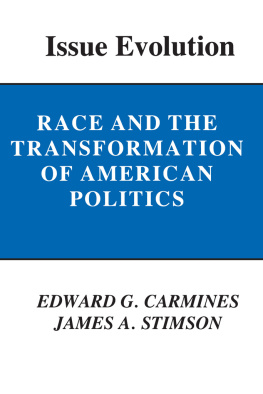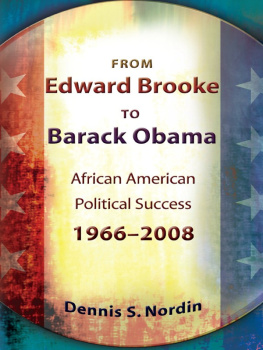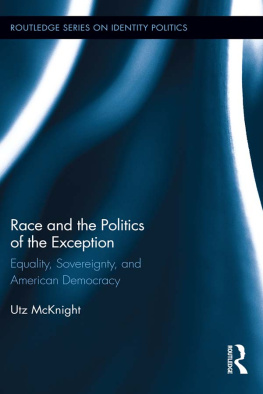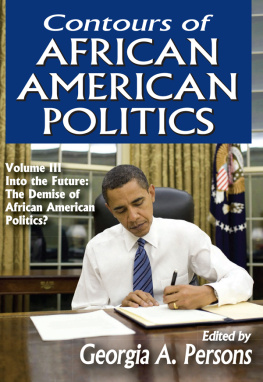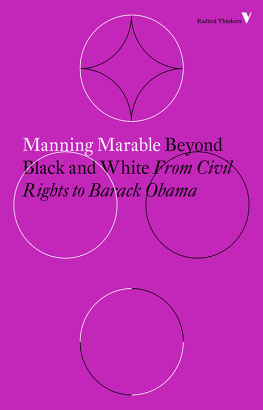Copyright 1989 by Princeton University Press
Published by Princeton University Press, 41 William Street,
Princeton, New Jersey 08540
In the United Kingdom: Princeton University Press,
Chichester, West Sussex
All Rights Reserved
http://pup.princeton.edu
Library of Congress Cataloging-in-Publication Data
Carmines, Edward G.
Issue evolution: race and the transformation of American politics
Edward G. Carmines and James A. Stimson.
p. cm.
Bibliography: p. Includes index.
ISBN 0-691-07802-5
ISBN 0-691-02331-X, pbk.
eISBN 978-0-691-21825-0
1. United StatesRace relationsPolitical aspects. 2. Afro-AmericansPolitics
and government. 3. United StatesPolitics and government1945
4. VotingUnited StatesHistory20th century.
I. Stimson, James A. II. Title.
E185.615.C35 1989 323.1196073dcl9 88-25463
R0
PREFACE
Dwight Eisenhower was president. November 4, 1958, would be an early evening for those who awaited the outcome of the biennial exercise in American constitutional democracy. Beginning with the first scattered reports from the East, confirmed by everything later and to the West, the Democratic party was scoring a stunning victory in the congressional elections. The early picture was clear. Democrats were winning all the close contests, and they were winning some against heavy odds. The pattern was unbroken through the night. On the morning after, the New York Times observed the sweep of House and Senate contests by the Democrats:
The greatest Democratic sweep since 1936 seemed to be in the making as the party scored spectacular gains in races for the House of Representatives. (p. )
Mr. Nixon, who formulated the Republican campaign strategy, and President Eisenhower, who adopted it, sounded the cry that Democratic gains in the North and West would elevate radical Democrats and create troublesome opposition for the Southern Democratic conservatives and the Republican administration.... [W]hat was really at stake was... the fate of the old coalition of moderate Democrats and Eisenhower Republicans that had worked harmoniously with the White House since 1955. (p. )
The election had been fought in the context of two critical events, both unfavorable to the Republicans. Recession gripped the American economy for the second time in the Eisenhower presidency. With memories of Hoover still fresh and fears of worse to come, American voters were reasserting their now traditional distrust of Republican economic management. Less openly a matter for political discourse, if no less on the minds of voters, was Sputnik. The first of a series of early Soviet triumphs in space technology, Sputnik was a shock to American self-confidence, resting on the (thought to be) firm ground of the inherent superiority of American technological know-how. After years of advance publicity about the coming triumphs of American space exploration, the nation was unprepared to witness Russian suecess where the United States produced but delay and failure. National humiliation is a difficult matter for party politics in a democracy; it certainly does not lead to issuesin the normal sense of that word. But like the matter of hostages in Iran more than two decades later, it shook American confidence in the party of the White House.
We did not know it then but the 1958 election was a turning point, an irreversible event that was to help launch a decade of racial politics and thereby reshape American politics for the remainder of the twentieth century. If we hold to the conventional view of elections, as means to settle issues of public debate, then the events of 1958 are strange indeed. For the lasting significance of the 1958 contest would be to unsettle the coming issue of race in American life. It unsettled this issuenot yet significantly on the agenda of American party politicsby putting in place for the epic battles yet to come a large and cohesive body of Democratic liberals who would not defer to southern sensibilities and southern political power over the delicate matter of race. That by itself would be important, perhaps crucial. But at the same time, and this is much less appreciated, 1958 decimated the ranks of moderate and liberal Republicans. For the Democratic victories did not come at the hands of conservatives. Republican liberalism, theretofore an important, often even dominating, force, would never recover from the body blow of 1958, an event of signal importance for understanding the Goldwater conservative insurgence of 1964 and the absolute conservative control of the Republican party in the 1980s.
The black civil rights movement that was to erupt so dramatically in the early 1960s can be understood as an event rooted in the rural South, a product of racial oppression, black religion, and charismatic and innovative leadership. But to understand why civil rights became a decisive political movement, not limited to blacks, not limited to leaders, not limited to the South, we need to come to terms with why a party system was ready for the revolution when it came. We can understand the great words, I have a dream... from Martin Luther King, Jr., without reference to American electoral politics; the dream was not the stuff of party platforms or election outcomes. But if we are to understand why Kings dream was spoken in the shadow of Abraham Lincolns Memorial and why millions of ordinary Americans witnessed it, then we need to piece together how the centuries-old aspirations of black America captured the moment in a particular place and time. That will require us to understand American party politics.
On the morning of November 5, 1958, we knew none of this. Indeed, while the great events of the 1960s were underway we failed to appreciate their lasting significance. Now we know all this was part of a larger picture. Whether or not the participants knew it, the great battles of the 1960s were fought over not only the rights of black people in America but also the future direction of American politics itself. Events of profound importance, world wars, the American debacle in Vietnam, and so forth, have come and gone, leaving behind only ripples on the calm water of American party politics. The struggle over race, at its peak the dominant issue of American political life for only some three years in the mid-1960s (Smith 1985), permanently rearranged the American party system. That is the subject of this book.
This book is a half-century portrait of an issue evolution in progress. The issue is race. The issue, more specifically, is the yet unsettled matter of the role of the black man in a white society. Sometimes it is called civil rightswe do not often use the term because it commonly refers to only part of the larger questionsometimes more prosaically integration or desegregation. The questions it raises bite deep: How much is enough? And how hard should we, as a society, try to do better? That is why they are yet unresolved. In their easiest form they challenge the law and the Constitution; in their hardest form they question our morals. They cause discomfort, anxiety, unease. They do not go away.
Race and the Transformation of American Politics, our subtitle, is an apt description of the book. We shall have much to say about race, but the issue itself is not our principal focus. We deal throughout with the fundamental question, what happened to American politics when race emerged as a political issue? That is not the only question that might be pursued, but it is the one that interests us. As students of American politics we are interested in institutions, their processes and behavior, and the public policies that result from them. We are interested in the mass electorate, in how and why it reacts as it does to the institutional environment. But more important than either of these, we are interested in the interaction between institutions and the electorate, how each influences the other. That interaction is necessarily studied as a dynamic process; it is seen in the adjustments and reactions of one to the other over time.

